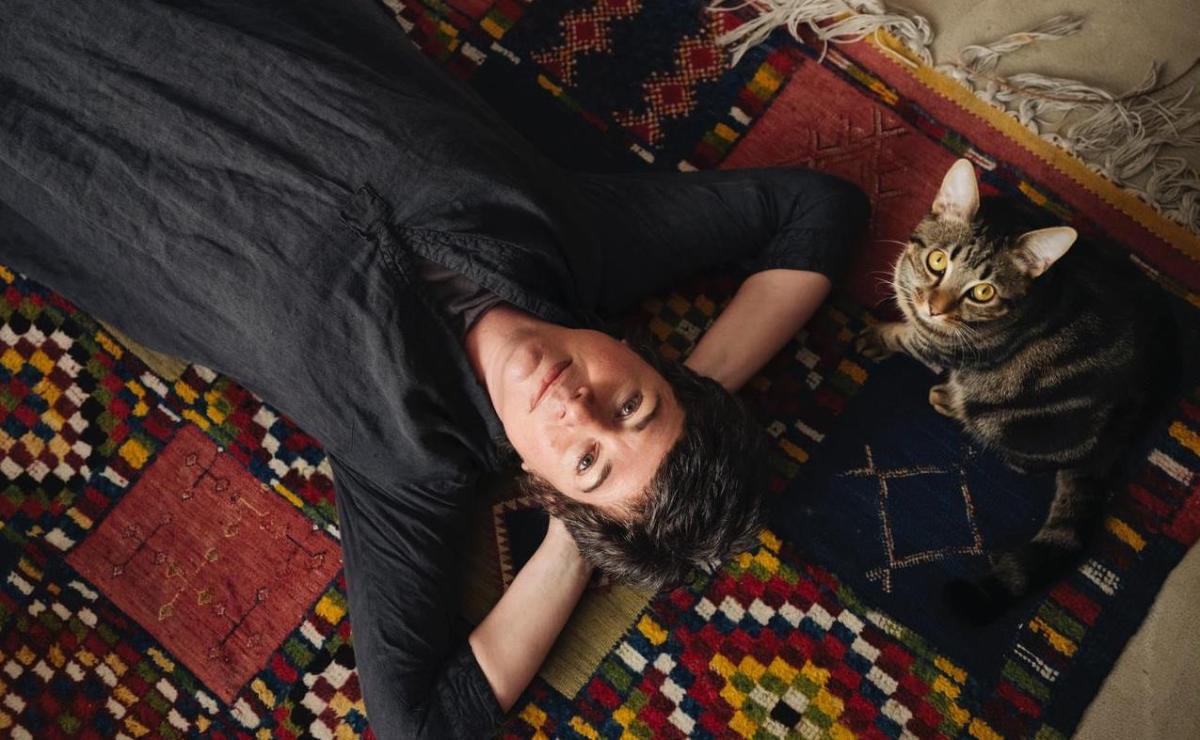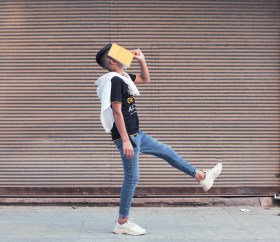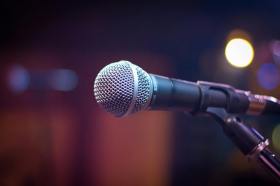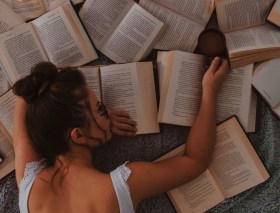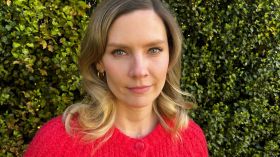

 COMPLETE EPISODE TRANSCRIPT
COMPLETE EPISODE TRANSCRIPT
[Theme music]
GD: Welcome to The ArtsHubbub, a monthly look inside Australian arts – and artists. I’m your host, George Dunford.
Well, we’ve almost made it through the year. A big year for all of us as we started with bushfires and funding cuts, then the sector got hit by COVID. So from there, we focused on artists in isolation and the impact of closures across the country. And in December we wanted to pull together for our Visions 2020 conference and swap notes on what just about everyone’s calling an ‘unprecedented’ year.
To help us make sense of this year, we spoke to one of our conference guests, Sophie Cunningham, who’s the editor of Fire Flood Plague, a book of essays from some of Australia’s top writers, scientists and historians that looks at some of the year’s lows and what we can learn from them.
Sophie’s a writer, editor and publisher, but in recent years, her attention’s been focussed sharply on telling stories about the environment, through writing about trees, birds or geography. The more she wrote about the environment, the more she found herself confronting the realities of our climate crisis.
SC: I realised that in some ways, I sort of wrote a lot about the weather and geography, and then that was combined with alarm – and then I suppose expertise, because the more you read, the more you learn, the more you feel that you have something to contribute, and confidence in an area. And I think other things I’ve written about, I’ve possibly run out of interest or not, you know, my interest hasn’t been maintained. But I remain incredibly kind of committed to trying to communicate this area.
GD: While she’s been in the publishing world for most of her career, Sophie feels the urgent need to write about the larger world. She’s been drawn into communicating science to a wide audience.
SC: I enjoyed science, I did science at school, my brother’s a scientist, I read a lot of science and I actually enjoy the challenge of trying to communicate sciency things. I also think that the ways in which we talk to each other and communicate what’s happening at the moment, is pressing. And it’s a challenge that I really enjoy. And while I like writing a lot, and I spent my whole life in the industry, I am more concerned by what’s happening in the world. And so something that bought together both my skills and the thing that keeps me up at night.
GD: 2020 has been a year of things keeping us all up at night, and the immediate impact of climate change in Australia, namely the bushfires, has been devastating.
SC: This year has been a very difficult year. And I found the bushfires very distressing and got really thrown by that sense that we’re actually falling off the cliff. You know, I’ve written about the fact that things are going to get worse, it’s going to be really difficult. But there’s a difference between thinking about those things, and actually, the sense of falling off the cliff. And that’s what New Year’s Eve 2019 felt like, was falling off the cliff.
–MUSIC–
GD: At the start of 2020 we’d barely heard of coronavirus and our world felt very different. But that New Year’s Eve became a tipping point for Sophie.
SC: Personally speaking, I and a group of friends were in a campground and we got evacuated, it burned about a week later. But the number of animals that got killed in the fires sort of undid me slightly, I have to say. You can’t overstate how horrendous that event was. And we were in danger of losing the things that make Australia special. The fact that we do have access to – well, did have access to a lot of wilderness – that people, normal people who just go out and about in the bush. It felt like a lot of that bush was disappearing, it was being either developed or being burnt.
I realised that I didn’t really know what it is to be an Australian if we don’t have the bush or the animals. They’re what make me feel connected to this place, the landscape and and the animals, more than the people really. I’ve met fabulous people all around the world, my connection to the place is quite strong.
GD: Sophie’s first book for children – Tippy and Jellybean – came out of that sense of connection to animals and place. It’s the story of a mother koala saving her baby from the bushfires. And she wanted to communicate the love and devastation she felt about the environment to younger audiences.
SC: So Tippy and Jelly Bean grew out of that particular concern. And I started, I’ve basically spent most of this year writing in this area, and plan to continue to do so.
–MUSIC fade–
GD: Most recently, Sophie’s documented environmental damage by editing the collection Fire, Flood, Plague: Writers Respond to 2020. The idea for the collection started with the Copyright Agency, who asked her to gather a spectrum of Australian writers, scientists and thinkers to bear witness to what an extraordinary year it has been.
SC: They wanted to try and document this year and wanted to sort of showcase some of Australia’s best writers and sort of provide the kind of way in which they could, you know, write a historical document, on one level – about what will probably be one of the most memorable years in people’s lives, or I hope so. [laughs] I hope this is one of the most memorable years of our life..
GD: Any collection is a challenge to include many different perspectives but documenting this year had Sophie and her collaborators trying to look at a year that was just always changing.
We sort of had a list of oh, probably 100 writers and … the issue to be honest was narrowing it down. And there are any number of really good writers that aren’t included. I was really interested in making sure that we covered a lot of bases.
SC: So yes, there’s a thing about trying to make sure you have someone from every state. And issues of diversity of culture, gender, age, but also of experience and types of writing is what, something that I was really interested in. I wanted to make sure that we had someone who might talk about these things in a more scientific way. I like scientists who can write, I wanted to make sure we had people who just really write very beautifully and capture moments.
And so, I basically drew on what I knew about various people, but I didn’t know all the writers so that those that I did, if I read the books or attended [or] been on panels with them, or whatever, I would ask them to write something quite specific that I knew they had some expertise in. So there was a real reason behind choosing everyone, basically. Gabrielle Chan is not a writer I’d worked with before. But we really wanted someone to write about what it might be like for people in the country, and dealing with the kind of supply and demand when roads are blocked, borders are blocked, and they’ve just sort of been rolling on from drought to bushfire to flood.GD: By knowing some of the contributors Sophie was able to approach them about their most intimate moments, including the poignancy of a single death in the middle of a pandemic.
SC: James Bradley is a friend, I knew that his mum had died. So I called James and said, “so do you feel like you can write about this?”
We kind of tried to fill in various gaps. I tried to get a couple of writers to write about homeschooling, they were like, “please leave me alone, I need to go and cry now, I’m not going to write anything for you.” [laughs] So there were some people, the whole year was so overwhelming, they just weren’t in a position.
I ended up writing on water. That was partly ‘cause no one else put their – noone else put their hands up for flood so “I’ll do flood”. I was also extremely interested in the topic I chose. And Richard McGregor has written about China and we didn’t necessarily quite understand what a big part of the story China would become. Jane Rawson talks a bit about the hope that you can keep yourself safe and her realisation you can’t necessarily, so where does that leave you? It leaves you, It leaves you with all different ways people have coping. It leaves you with being diligent about your recycling, it leaves you with flying less, it leaves you with fighting bushfires, it leaves you with trying to rescue bats on hot days, you know, there’s a lot of things that people can actually do that will make a difference. And I personally am trying to kind of nudge people to that more hopeful or at least engaged life, rather than thinking that you can keep yourself safe and somehow cut yourself off from it, ‘cause you can’t. –MUSIC–GD: With the pandemic, we’ve seen a concerted effort to come together, in local communities, state-by-state, nationally and perhaps even internationally.
And Fire Flood Plague highlights that in spite of the immense challenges of our times and the dramatic shift in how we live our daily lives, communities can still be built – and rebuilt. But can this sense of change brought forth by the pandemic be harnessed into real action?
–MUSIC fade — SC: Politics continues to be played with climate change in a way that it wasn’t with the pandemic. So in some ways, it’s actually depressed me [laughs] because of the fact that they’re not joining up the dots in the way that you might hope … However, other people have started to join the dots. Any number of organisations in the last two weeks have come out, talking about having much stricter governance around issues of trying to reduce carbon emissions.So I do think at a certain point, the economic issues – and it’s going to be hard to make nearly as much money from mining coal does – will actually mean that industry might grind to a halt. It’s not as quick as we would like, but the change is happening.
GD: It’s been a year when the impossible has happened. JobSeeker has been given to thousands of people to not work and those that are still in jobs are working from home in numbers that most bosses would have frowned at in 2019. And climate change is now a very real climate crisis. Sophie and the other writers in Fire Flood Plague are facing the world as it has become.
SC: For me, personally, leaning into my distress and concern has actually kept me sane. I think to try to pretend it’s not happening. It’s just impossible. It makes me feel worse, I don’t know. It’s like, when you’re in an appalling relationship or something, you know, really stressful that’s happening in your life, if you try and pretend it’s not happening, it just makes it worse in a way. It’s not yet repressing. Something about sort of embracing your understanding of what we’re going through as a community and trying to think about how do we build community, and connect to each other and help each other through this time, has been my way of coping with what I think will be an increasingly difficult few decades.
–MUSIC–
GD: Perhaps hope has been the most endangered species in 2020, as we went from bushfires to coronavirus. So we asked Sophie what keeps her hopeful as she writes and thinks about that year that we’ve just had.
SC: And I think the question, really, for me is, what do you mean by hope? Like, I, hope is a very vague word, I think it’s unrealistic to hope that summers by the Australian beach will be what they used to be. Our way of life will change. But that doesn’t mean that we won’t still have a good way of life. It doesn’t mean that life can’t be can’t be full and rich. And also, I mean, species do come back given the right set of circumstances. I’ve just been reading about Macquarie Island and the various predators down there meant that they were in danger of losing a lot of their, you know, penguins and seals and various other animals. But they managed to get the predators off the island and those communities are, to some extent, thriving.
Nature is incredibly responsive. So that is, I suppose one of the things that gives me hope; I do feel like things are finally starting to change. And that’s what’s giving me hope.GD: We’ll be continuing our conversation with Sophie about hope at the Visions 2020 conference on December 9, where she’ll be in conversation with Jose Roca about Art and the Anthropocene.
–MUSIC fade —[Ad Break]
Upskill or explore your creativity with a summer intensive course at AFTRS. Taught by expert industry practitioners, get back to face-to-face learning in a safe environment by enrolling in one of these courses on our world-class campus. AFTRS’ Summer Intensives run from December 2020 to February 2021. Book now to receive a 10% early bird discount: aftrs.edu.au
[Events] -Music fades in-GD: After a long pause in 2020 we’re excited to see so many events opening up across the country again. Here’s what’s coming up in the arts this summer:
In January, Sydney Festival kicks off the year with 130 events across three weeks, including new works by Circa and Force Majeure, as well as a Bangarra retrospective drawing on three decades of thrilling dance.
We’re also looking forward to Perth Festival, in February, and Adelaide Festival, running from 26 February until 14 March.
In Canberra, don’t miss the exhibition that centres female creators: ‘Know My Name: Australian Women Artists 1900 to Now,’ showing until July.
In Melbourne, the NGV Triennial, showing from 19 December until 18 April should definitely be on your cultural radar.
And the Telstra National Aboriginal & Torres Strait Islander Art Awards are showing until the end of January at the Museum and Art Gallery of the Northern Territory.
– Theme up for credits –
[Credits]
GD: Thanks for listening to The ArtsHubbub this year. We’ll be back in 2021 with more from the Australian arts sector. Until then you can listen to previous episodes looking at artistic activism, recovery through creativity and the wisdom of elders.
If you want more information on the Visions 2020 conference including tickets and streaming of the events head to events.artshub.com.au/visions2020.
It helps us if you leave a review at Apple podcasts.
Our guest this month was Sophie Cunningham.
The ArtsHubbub is produced by Michelle Macklem, Sabine Brix, Richard Watts and George Dunford.
Our theme music is ‘Chasing Waterfalls’ by Tim Shiel. Music in this episode also by The Other Stars.
This podcast was produced on the lands of the Kulin Nation. We pay our respects to Kulin Elders, past, present and Emerging. Sovereignty has never been ceded.

